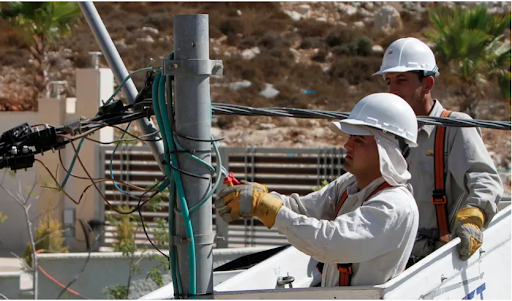
Israel gives the Palestinian Authority control over three power plants in the West Bank
This decision, welcomed by the Palestinian Authority despite the diplomatic stop, should stabilize the power supply in Judea-Samaria, which is plagued by frequent blackouts.
The Israel Electric Corporation has given the Palestinian Authority control of three West Bank electrical substations – in Tarqumiyah, near Hebron, Qalandiyah, between Jerusalem and Ramallah, and Nablus. They join a fourth in Jenin, which was transferred to Palestinian control in 2017 after lengthy negotiations.
Despite the diplomatic standoff with Israel, the Palestinian Authority welcomed the agreement, announced on Monday, which Israel said will also help improve electricity supplies to West Bank settlements.
Until now, most Palestinian energy needs in the West Bank have been supplied by the Jerusalem District Electricity Company, a semi-private company partly owned by the Jerusalem municipality and several Palestinian cities. It purchases electricity from Israel and then supplies it via high-voltage lines to Palestinian consumers.
In recent years, Palestinians have reported frequent power outages, partly due to an overloaded system but also due to a deliberate cut in energy sharing by Israel, as Palestinians owe the government-owned power company hundreds of millions of shekels.
The Israel Electric Corporation said that the West Bank stations would now be able to provide electricity in an orderly manner, but that this does not mean that the debt to Israel is cancelled.
The Palestinian government supports the agreement, which it says could be a step towards building an integrated electricity supplier in the Palestinian territories. “We welcome the cooperation between the parties and the arrangement for the provision of electricity throughout Judea-Samaria,” said Prime Minister Muhammad Shtayyeh.
“We seek to create a single Palestinian electricity company responsible for the electricity infrastructure to avoid illegal connections and a division of responsibilities among dozens of suppliers,” he added.
Israel has sought to emphasize that the agreement means improvements for Jewish residents and an attempt to align the infrastructure in Judea-Samaria with that found throughout Israel.
“The establishment and operation of the three substations in Judea-Samaria will greatly improve the electricity supply to the Jewish and Arab communities,” said Energy Minister Yuval Steinitz of Likud, using the Israeli name for Samaria Judea.
“This is an important step towards equalizing the level of infrastructure in Judea-Samaria with the rest of Israel,” Steinitz said.
The president of the Jerusalem District Electricity Company said the measure would add to an overall increase in its power supply capacity, which also benefits from a boost in its cooperation with Jordan. Yiftah Ron-Tal, president of the Israel Electric Corporation, said the effort “will relieve pressure on the power grid and greatly improve the reliability of power supply to Israelis living in Judea and Samaria and to Palestinians”.

Be the first to comment